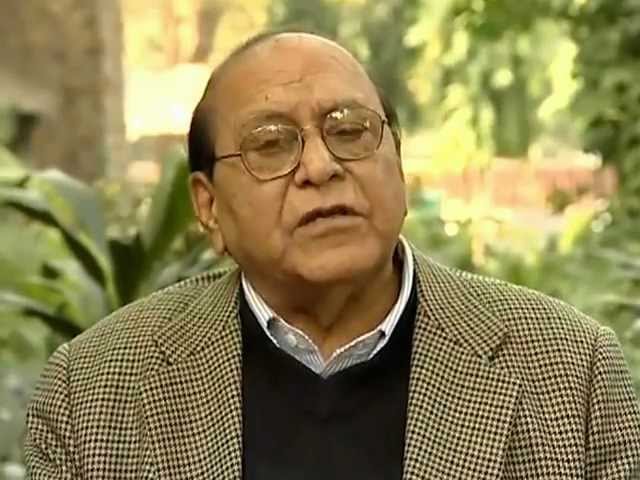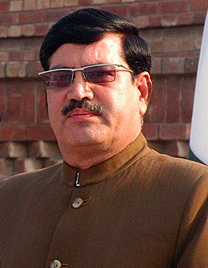Another heavyweight of Urdu has fallen. Prof Gopi Chand Narang was a pillar of Urdu. When he was bestowed upon the Padma Bhushan in 2004, he was the only Urdu critic to get the Padma Shri as well. There’s hardly any Urdu forum that hasn’t honoured him. So has Pakistan’s Iqbal National Open University. So many Urdu and Persian awards have been heaped upon the professor. And interestingly, Professor Narang happened to be the only Urdu critic from India interviewed most by Pakistan Television. Of the most sought after Indian figures in Pakistan, Narang was second only to former Prime Minister, Atal Behari Vajpayee. Incidentally, both were so popular in the country across the border that a mere mention or reference of their names helped a person attain a Pakistani visa!
In 1977 he was awarded the national gold medal of Pakistan for his research on Iqbal. Even today in Pakistan’s literary circles, Gopi Chand Narang is known as India’s cultural ambassador. Writers know that Narang had always raised his voice against parochialism, religious fanaticism and social injustice. Communalists, be they from the Hindi or Urdu lobby, had always tried to derail him. According to Narang, one may be an activist, but in a democracy one does not need a party card to enter the field of letters.

A writer’s basic commitment is to the sanctity of shabda, concern for humanitarianism and a sense of nationalism. Sahitya Akademi, whose chairman he was, happens to be the biggest literary body anywhere in the world looking after 22 languages. At the same time, he was also the consultant to the biggest ever government Urdu body, that is NCPUL (National Council for Promotion of Urdu Language). But according to him, the fact remains that even today it is extremely difficult for writers of Indian languages to make both ends meet by full time writing.
Narang took interest in formulating an Encyclopaedia of Indian Katha Sahitya and an Encyclopaedia of Indian Poetics. Renowned Bengali intellectual Sisir Kumar Das had completed the painstaking job. The National Bibliography of Indian Literature from 1954 till date is another enterprise that Narang has almost completed. Narang also happens to be that celebrated rare intellectual who had spurned the lure of office to pursue his scholastic work.
Narang, according to senior bureaucrat-cum-writer and now, politician Pavan K Varma, is noted for being brutally frank where the question of defending Urdu is concerned. His “literary adversaries” (of whom there is no dearth!) can do anything but ignore him.
Having been brought up in the dry, mountainous terrain of Balochistan and Narang’s mother tongue being Saraiki (a blend of western Punjabi, Sindhi and Pushto), his background conspired against him. Even at his school Musa Khail, Pushto was the medium but he held the fort for Urdu. His father Dharam Chand Narang too was a litterateur himself, and a scholar of Persian, Arabic and Sanskrit, who inspired Gopi’s interest in literature
Some of Narang’s famous and award winning books include — Hindustani Qisson se Makhuz Urdu Masnawiyan, Urdu: Dilli ki Karkhandari Boli, Urdu ki Taleem ke Lisani Pehlu, Puranon ki Kahanian and Amir Khusrau ka Hindvi Kalaam. He finds Urdu to be one of the finest products of composite literature. Among comity of Urdu scholars, Narang is very highly regarded. Truth is that no one can match his stylistic vocabulary.
Narang also happened to be the unquestioned master of Urdu phonetics according to Dr. Aqeel Ahmed, the director of National Council for Promotion of Urdu Language, Delhi, Urdu, according to Narang, has been the language of inter-faith harmony and has served as a common bridge between Hindus, Sikhs and Muslims right from Amir Khusrau in the 13th century.
Narang believed that the politicization of Urdu has resulted in its downfall. The Urdu card played by politicians has resulted in its degradation. “Urdu is not the language of Muslims. If at all there is any language of Muslims, it should be Arabic,” opined Gopi Chand. Urdu belongs to the composite culture of India, truly.
Being an illustrious student of Delhi College (now Zakir Hussain College), Narang had taught in various universities, including the University of Wisconsin and the University of Minnesota.
Once while speaking to his Pakistani poet friend Ahmed Faraz, he said: “Do not monopolize, fanaticize and politicize a language. Urdu is one of the national languages of India and not a natural language of even a single region of Pakistan from Karachi to Lahore and Quetta to Peshawar. The litterateurs of the two countries must interact with each other.” (The author is a former chancellor and commentator on social and educational issues).

Firoz Bakht Ahmed is a former chancellor of Maulana Azad National Urdu University (MANUU), commentator on educational and social issues, community worker and the grandnephew of Bharat Ratna Maulana Abul Kalam Azad. He lives in Delhi


